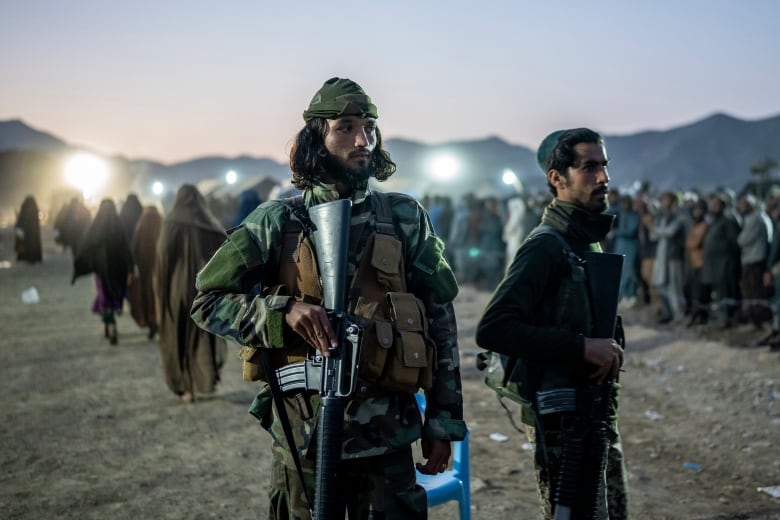Canadian aid groups say Ottawa hasn’t cleared roadblocks that bar them from getting aid into Afghanistan, despite Parliament passing legislation this spring and allies issuing carve-outs to their own terrorism laws nearly two years ago.
Until this June, aid workers were vulnerable to prosecution under the Criminal Code if they paid taxes for labour or goods to Afghanistan’s Taliban government, because doing so would amount to providing financial support to an entity that Canada lists as a terrorist organization.
Parliament passed Bill C-41 in June, which sought to enact a blanket exemption for humanitarian workers providing life-saving aid in response to emergencies.
It also committed Ottawa to eventually creating a permit process for development workers, such as those building schools, to apply for exemptions to terror laws.
In their April budget, the federal Liberals earmarked $5 million in this fiscal year to vet such applications, and another $11 million in the following year.
But Ottawa still has no timeline for launching the permit process for development work. And some humanitarian groups say the blanket exemption isn’t enough for them to provide urgent support in Afghanistan.
World Vision Canada’s policy director Martin Fischer says he’s “frustrated and bewildered” that the process is taking so long.
“We’ve been in touch with Global Affairs and Public Safety at several moments to say that this regime needs to be put in place with urgency,” he said.
The Canadian head of Islamic Relief recently testified at a Senate foreign affairs committee hearing that there is widespread confusion about how the legislation works.
“It’s not moving fast enough,” Usama Khan told senators in late October.
“I’ve heard directly from some aid agencies that it’s still status quo in terms of not being able to deliver aid because there is no clarity on what is allowed.”
Khan said that different departments are giving contradictory information on what counts as humanitarian versus development aid, since the latter requires a permit.
Featured VideoA Canadian veterans group says roughly 50 Afghans with ties to Canada have been deported from Pakistan back to Afghanistan. Ottawa says it is trying to process claims faster during the crackdown.
Fischer said bureaucrats have consulted him on the same question, which he found confusing since Global Affairs Canada has long-standing definitions that sort out which initiatives count as reactive humanitarian projects and which are proactive development work.
“It’s hard to understand why the machinery of government is having a hard time putting in place what should be a pretty straightforward bureaucratic process,” Fischer said.
He also noted that the humanitarian exemption that took effect immediately in June has worked for some projects. Fischer said it’s allowed World Vision Canada to proceed with health and nutrition work in Afghanistan, though they still can’t do work to advance women’s rights without a permit.
Public Safety Canada would not provide any detailed explanation of what’s holding up the process, or say when groups will be able to apply for permits for development work.
“The work on implementation of the authorization regime is underway,” spokesperson Louis-Carl Brissette-Lesage said in a written statement.
“Government departments and agencies are working diligently towards being able to start accepting and processing applications.”
Khan and Fischer both said that charities are unclear about how information they provide to Ottawa regarding projects operating in Afghanistan will be handled.

The sector isn’t sure which privacy protections the federal government will uphold when it comes to Canadians and local staff who are working on projects in Afghanistan that may put them at risk or draw scrutiny from the Taliban.
“It’s not clarified in the legislation itself. The (departmental) guidance needs to clarify that,” Fischer said.
He noted that the legislation includes a mandatory review set to take place next June. He said he worries the system will start operating so late that charities won’t have enough experience using the law to suggest how it can be changed.
“Nobody’s been able to engage with it — because it’s not in place.”
MPs first called for the issue to be resolved in June 2022, noting that the U.S., Australia and multiple European countries had already found ways for aid workers to help people in Afghanistan without facing terrorism charges.
The United Nations has determined that two-thirds of the country’s population need humanitarian aid.
“Afghanistan is facing an unprecedented humanitarian crisis with a serious risk of systemic collapse and human catastrophe,” reads the latest update from the UN’s lead humanitarian agency.
The country is beset by economic decline, malnutrition, global inflation shocks, a teetering health system and natural disasters.


